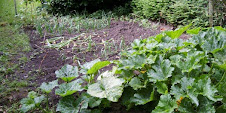We came to the end of our little experiment just over a week ago, at which point we threw a big party and invited everyone round for a barbeque to celebrate our gustatory freedom. Between the two of us we lost perhaps a couple of pounds of spare flab, which most people seemed to find odd, as if they were expecting us to look like a pair of concentration camp survivors after only a month of restricted eating. Truth be told, we were eating more red meat (albeit very lean offal), more puddings, more potatoes and more saturated fats than we would normally; or at least enough of that stuff in regular meals to make up for the naughty snacking treats we were being deprived of. Probably if we had to eat this way for a prolonged period of time, our bodies would get more used to it, and we would experience unavoidable weight loss. Moreover, because it takes a bit more effort to obtain and cook the rational kinds of meals - digging the garden, walking to the market for the freshest, cheapest offal, cooking for hours - the extra activity is bound to take its toll in the long run but maybe won't manifest itself in the space of four weeks.
More than the naughty snacks, I think we both missed fruit more than anything. Happily we had quite a range of seasonal veg to choose from but being limited to specific kinds of apples and a few summer berries was extremely difficult and we've made it through about 20 bananas, 30 kiwi fruits and several watermelons since returning to the land of irrational eating. Once you break the cycle of easy treats like crisps, chocolate and biccies, you really don't crave them very often. But walking past the imported fruit section of our local co-op and greengrocers was really quite horrible after the second week. Still, we were lucky to have any fruit at all and a rather large array of vegetables to choose from, so I think we timed the experiment well: it would have been a lot more difficult to endure in the winter months, being basically limited to root vegetables and brussel sprouts, and we might well have suffered in the way of vulnerable immune systems.
Above all, I think the greatest revelation was the versatility, tastiness and amazing value of offal, particularly heart, which is just as good as any stewing steak and much cheaper. I've already detailed the grizzly downsides of these kinds of meat, but I think it is worth emphasising that offal is a wonderful resource and one that people shouldn't turn their noses up at simply because they find it distasteful (I'm not sure if I intend the pun or not). If you're put off by having to deal with the messy business of pulling out veins and valves, just get over it. If you're prepared to eat an animal at all and you have a little imagination, you can't possibly avoid the fact that the thing you're eating used to be covered in fur, wool or hide, wander round some fields and make endearing noises. And all the bits of an animal that is killed for food should be utilised or we've done that animal a great disservice. Either become a vegetarian or stop being such a hypocrit. Obviously you just might not like it, but at least give it a go with an open mind before you come to any conclusions.
As for my conclusions, that brings my little sermon to an end. I would recommend undertaking a little rational experiment of your own, if only as a way of introducing yourself to growing, brewing and stewing. If anyone does feel inspired, let me know if you want any tips, or just let me know!
Monday, 6 July 2009
Subscribe to:
Comments (Atom)
